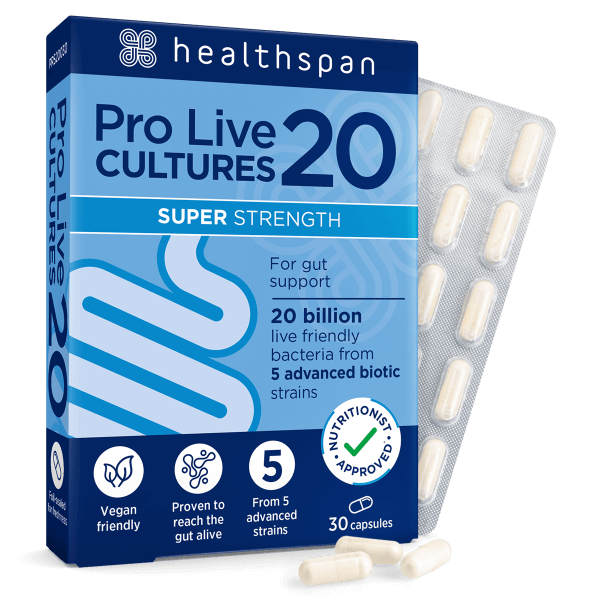Can a personal diet prescription boost your mood and mental resilience? Psychotherapist Sally Brown looks at the evidence.
Customising your diet could be the key to good mental health, according to a new study.1
Research carried out over five years at Binghamton University, State University of New York found links between eating habits and the risk of depression and anxiety.
But they also found that one size does not fit all, and that what makes a feel-good diet differs depending on age and sex.
So, what's the evidence that customising your diet really can make a difference to your mental wellbeing, and how do you find out what will work for you?
The gut-brain axis
The past decade has seen exciting research into the link between the mind and the gut, with studies showing that the balance of the gut microbiome – the bacteria in the digestive system – can protect against depression and anxiety.
Sometimes called the 'second brain', most of us know from experience that the gut acts like a barometer of how we're feeling, reacting with butterflies when we're excited or nervous, or a sinking feeling when we get bad news.
But now researchers are finding evidence that rather than just reflecting our state of mind, the gut – and what we eat – might influence it.
According to a study conducted at CalTech in 2015, it was estimated that 90 per cent of our serotonin – the brain's 'happy chemical' – is produced in the digestive system.2
Age and sex matters
Women's mental health in particular responds to dietary changes, according to Dr Lina Begdache, who led the Binghamton research.
She studied 2,600 people over five years, looking at differences between those who are younger (18-29) and more mature (30 plus).
Age matters because the brain is still maturing up to the age of 30, building new structures and connections, creating specific energy and nutrient demands, says Dr Begdache: "As a result, young adults who consume a poor quality diet and experience nutritional deficiencies may suffer from a higher degree of mental distress."
She also compared the sexes and found that the mental health of women across the ages is more affected by diet than men's.
Good mood tweaks by age
Female and under 30
- Start the day with porridge. It's particularly important for younger women to start the day with breakfast, says Dr Begdache, as it balances blood sugar, which helps support mood. Oats are also a good source of fibre, which supports the gut microbiome.3
- Limit caffeine. Caffeine is metabolised by the same enzyme that metabolises the sex hormone oestrogen and testosterone, so it's especially important for younger people not to overdo it.

Young women should always eat breakfast, as it helps balance blood sugar.
Male and under 30
- Cut back on fast food. Good mental health in younger men was linked with low consumption of fast food according to Dr Begdache's study. Earlier research also linked a diet high in processed foods with poor mental health in adolescents and children.4
- Think protein. Dr Begdache's study found that regular protein intake was linked with good mental health in men under 30.
Female and 30+
- Opt for brunch, not breakfast. Dr Begdache's research found that in older women, skipping breakfast was linked with more robust mental health.
- Eat more fruit. Dr Begdache's study found a link between high fruit consumption in women over 30 and resilient mental health.
Male and 30+
- Snack on nuts. Older men who snacked on nuts were less prone to depression and low mood, according to Dr Begdache's research. Good choices include walnuts, which contain omega-3 fatty acids, and Brazil nuts, which boost selenium, which may support serotonin production.
Diet tips for all ages
- Support your gut. Taking a probiotic supplement to help balance the gut microbiome may help alleviate symptoms of depression and anxiety, according to new research.5
- Boost omega-3s. Recent research has linked depression with inflammation, and healthy fatty acids such as omega-3s help keep the body's inflammation response in check.
- Eat your greens. Spinach and other dark leafy greens, brussels sprouts and asparagus are all a good source of vitamin B9, or folic acid. Research shows people with low folic acid levels can be vulnerable to depression.
- Eat mindfully. 'Savouring' is a technique from positive psychology to help us pay more attention to life's happy moments. Taking time to enjoy meals also helps with digestion, maximising the mood-boosting potential of nutrients.

Pro Live Cultures 20 – Super Strength
Supports a healthy gut
- 20 billion live cultures from 5 well-researched strains
- Contains Lactobacillus acidophilus, Lactobacillus paracasei, Bifidobacterium lactis and Bifidobacterium bifidum
- Supports the protective intestinal microflora in the gut
Seek help if needed
Of course, diet is just one factor that may impact mental health, and changes in mood are often a natural response to life events and experiences.
But if low mood or anxiety persists or starts to affect your quality of life, you may need extra support. Sharing how you feel with someone supportive, or a therapeutic professional, is an important first step.
Keeping active can also help – Dr Begdache's research found that regular exercise protected against poor mental health in all ages. But given that the mind and body work in tandem, it makes sense that what you eat can also impact your mood and emotional wellbeing.
And making an effort to prepare nutritious food is good for self-esteem, sending yourself the message that you're worth taking care of.

Keeping active also helps protect against poor mental health.
Keep a food diary
But how do you discover your own personal good mood diet?
Keeping a food diary or notes on your phone or a food diary app about what you've eaten and how you feel can be a good way to spot patterns and links. You could also try to experiment by making small tweaks and noting any difference.
Eating well isn't a quick fix, so don't expect overnight changes to your state of mind. But following some of these suggestions based on the findings of Dr Begbache's study and other research may help.






